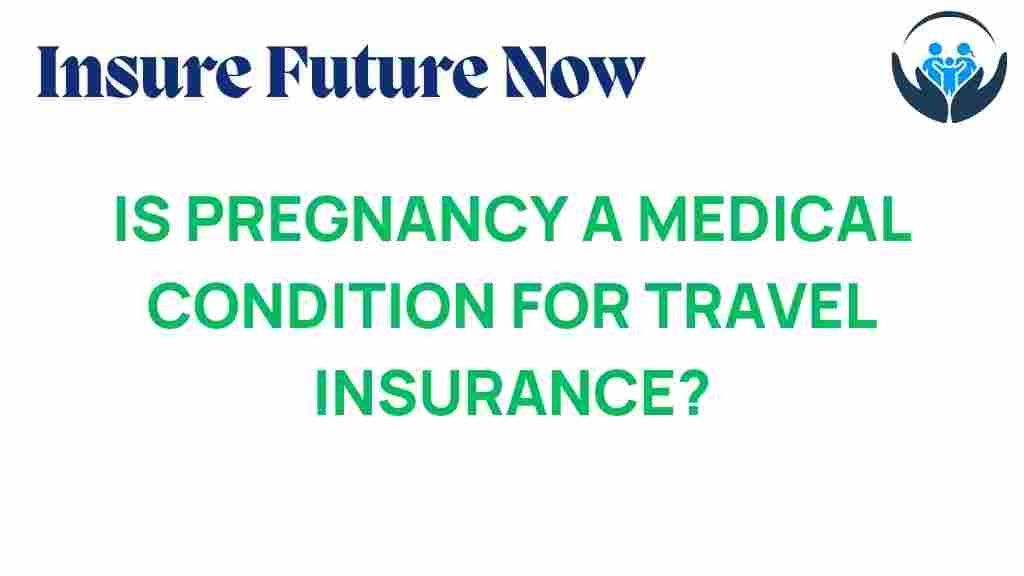Is Pregnancy Considered a Medical Condition for Travel Insurance?
When planning a trip, many expectant parents may wonder about the implications of pregnancy on their travel insurance. Understanding how pregnancy is viewed in the context of travel insurance is crucial for ensuring peace of mind during your travels. In this article, we will explore whether pregnancy is considered a medical condition for travel insurance, what coverage is available, how to make claims, and tips for choosing the right provider and policies.
Understanding Pregnancy and Travel Insurance
Travel insurance is designed to protect you against unforeseen events that could disrupt your travel plans. This includes medical emergencies, trip cancellations, lost luggage, and more. However, the inclusion of pregnancy as a medical condition in travel insurance policies can vary significantly between providers.
Pregnancy itself is a natural state; however, it can come with certain risks and complications that might affect travel plans. As a result, many insurance companies treat pregnancy as a medical condition, which can impact your coverage options.
Why Pregnancy Matters for Travel Insurance
When considering travel insurance during pregnancy, it’s essential to understand the potential risks involved. Some of the factors that can complicate travel include:
- Pre-existing conditions related to pregnancy
- Potential for premature labor
- Access to medical care while traveling
- Travel restrictions based on gestational age
Because of these factors, many travel insurance policies will have specific clauses regarding pregnancy, often categorizing it as a medical condition that could affect coverage.
Step-by-Step Process: Securing Travel Insurance During Pregnancy
1. Research Insurance Providers
Begin by researching various travel insurance providers that offer policies for pregnant travelers. Look for companies that specifically mention coverage for pregnancy-related issues. Major providers often have clear guidelines regarding what is covered and what is not.
2. Compare Policies
When comparing policies, pay attention to:
- What medical conditions are covered
- Limits on coverage for pregnancy-related claims
- Exclusions related to pregnancy
- Emergency medical benefits
- Cancellation coverage due to pregnancy complications
Ensure that the policy you choose provides adequate coverage for your needs, especially as your due date approaches.
3. Disclose Your Pregnancy Status
Be transparent with your insurance provider about your pregnancy. Failing to disclose this information could lead to denied claims later on. Most providers require you to declare your pregnancy and any related medical conditions when applying for coverage.
4. Understand the Coverage Limits
Travel insurance policies often have specific limits regarding pregnancy. Key aspects to understand include:
- Coverage for complications that arise from pregnancy
- Emergency evacuation coverage if medical care is needed
- Coverage for trip cancellation due to pregnancy-related issues
Be sure to read the fine print to avoid surprises when you need to file a claim.
5. Review Claims Process
Familiarize yourself with the claims process of your chosen provider. Knowing how to file a claim and what documentation is required can save you time and stress in case of an emergency. Most providers will ask for:
- Medical records related to your pregnancy
- Receipts for medical expenses incurred while traveling
- Proof of travel arrangements
Troubleshooting Tips for Common Concerns
1. What If I’m Close to My Due Date?
Traveling late in pregnancy can be risky. Many airlines and travel providers have restrictions on pregnant travelers who are beyond a certain gestational age (typically 36 weeks). Before booking your trip, check both the airline’s and insurance provider’s policies to ensure compliance.
2. How to Handle Complications While Traveling
If you experience pregnancy-related complications while traveling, seek medical attention immediately. Keep in mind that your travel insurance may cover emergency medical expenses, but you will need to provide documentation to support your claim later.
3. Can I Cancel My Trip Due to Pregnancy Issues?
If you need to cancel your trip due to pregnancy complications, your travel insurance may cover the costs. However, this will depend on the specific terms of your policy. Always check if cancellation due to pregnancy is included in your coverage.
Benefits of Having Travel Insurance When Pregnant
Investing in travel insurance while pregnant provides several benefits:
- Peace of Mind: Knowing that you have coverage in case of emergencies can help you relax and enjoy your trip.
- Financial Protection: Travel insurance protects you from unexpected costs related to medical emergencies or trip cancellations.
- Access to Necessary Care: If you need medical assistance while traveling, having insurance ensures you can receive the appropriate care.
Ultimately, the right travel insurance policy can provide a safety net that allows you to focus on enjoying your trip and preparing for your new arrival.
Conclusion
In conclusion, pregnancy is often considered a medical condition by travel insurance providers, and understanding the nuances of coverage is essential for expectant travelers. By researching providers, comparing policies, and being transparent about your pregnancy status, you can find the right coverage to suit your needs. Remember to read the fine print, understand your coverage limits, and keep essential documents handy for claims.
For more information on travel insurance options, visit this resource. If you’re looking for tips on traveling while pregnant, check out our other articles here.
Traveling during pregnancy can be a wonderful experience if done safely and with the right preparations in place. Make sure you’re covered and ready for any adventure that awaits!
This article is in the category Coverage and created by InsureFutureNow Team
